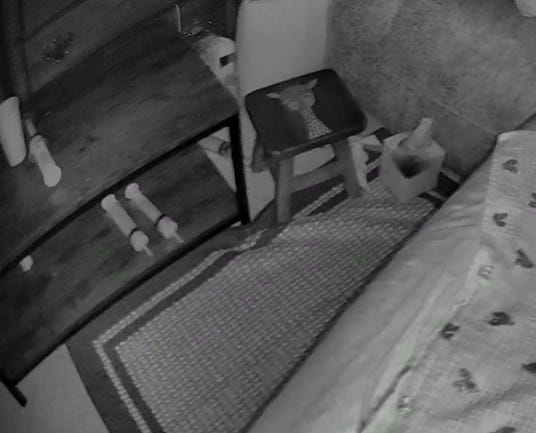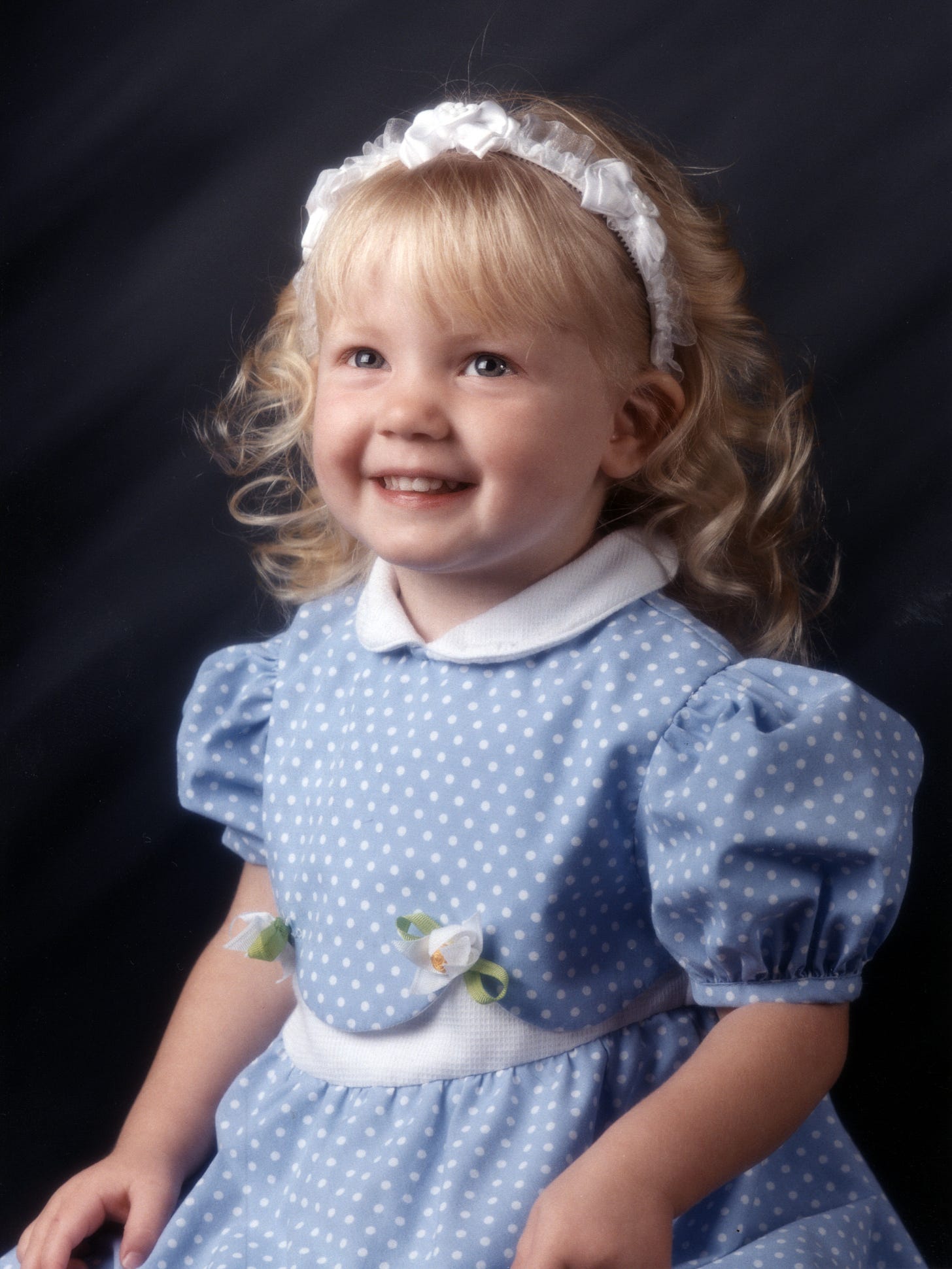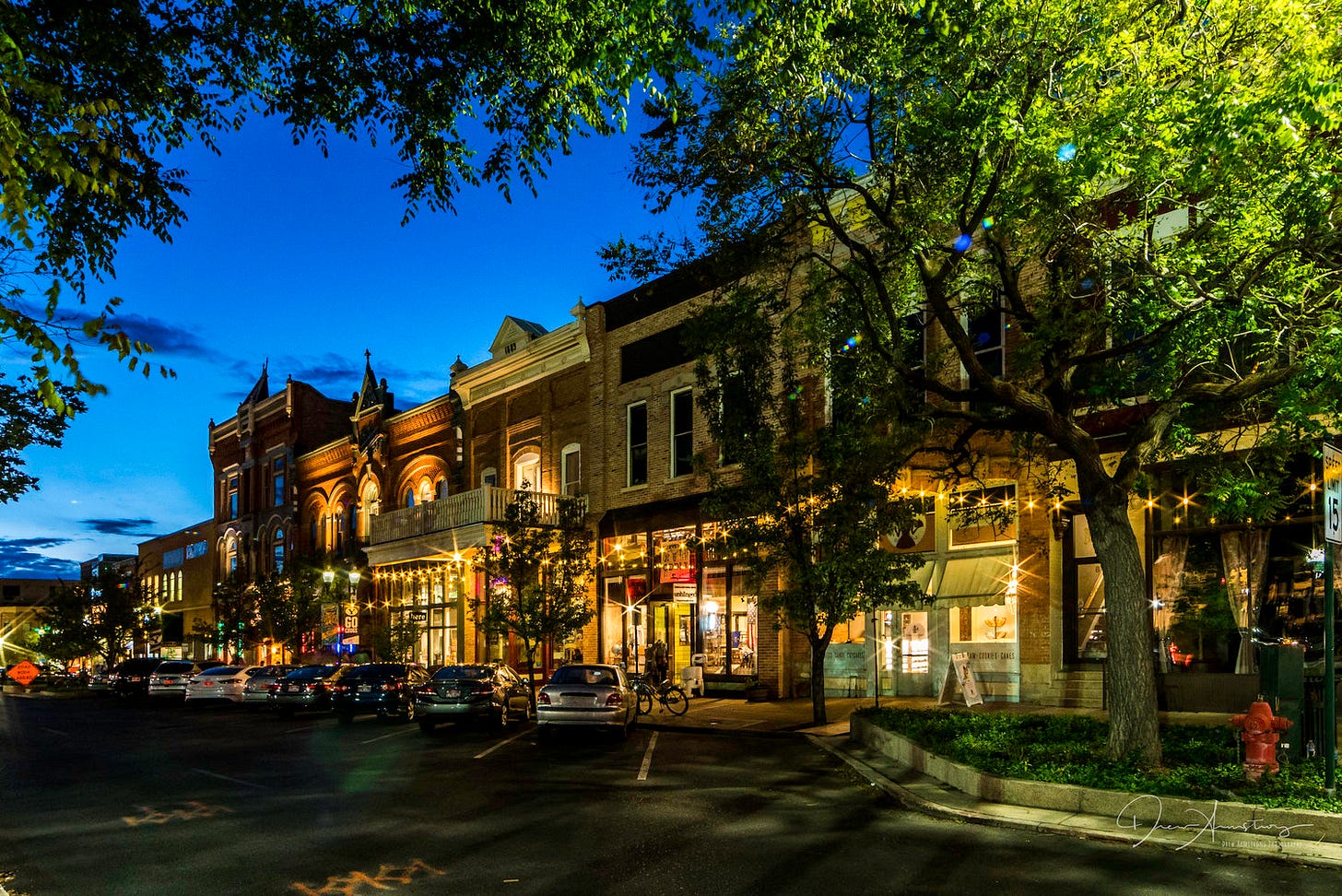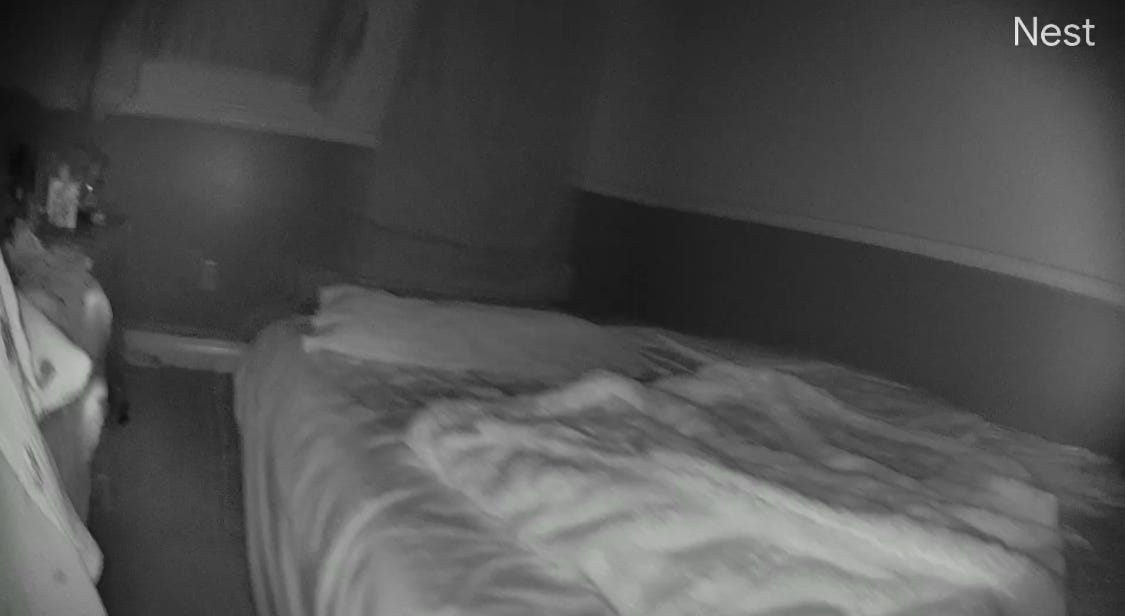“Dream” is a noun with two meanings. It can refer to 1) the bizarre things we experience when we sleep and 2) our fondest aspirations. The word retains its duality in translation across most languages.
These five letters casually place the nonsensical and the sacred under the same roof, implying an association between the impossible worlds our unconscious minds explore and possibilities in the waking world.
To entertain a dream is to question reality. We ask it to make space for our deepest desires.
“Die?”
My left ear is floating an inch above Becca’s mouth when she whispers the question. It takes me a moment to register what she has said. I stay awkwardly bowed over her bed, holding my breath until I guess the translation.
Am I going to die?
Becca rarely says anything. She can’t. And doctors don’t know why exactly. She has a body powered by faulty mitochondria and senses the world through a crashed-out nervous system wrapped in overactive immune cells. The chaos keeps her brain’s language centers understaffed. It’s one of the many mysteries of severe ME/CFS, a condition so few medical professionals study that I could gather the whole bunch for a nametag-free conference in my basement.
Sometimes Becca will risk everything to say a word. Just a syllable or two. While the sounds form I wait close enough to her lips that I feel the warmth of her face and a tickle of breath. I can almost hear the gears in her head grinding away.
Tick, tick, tick, clunk…
Tick tick... crash.
Her internal computation starts and fails many times over.
I can stay bent over her bed for about a minute before my back starts to ache. I straighten for a bit of relief and with the sharp click of her tongue she calls me back in close. This bowing ritual can carry on for as long as 10 minutes. The room is pitch black. An air purifier hums along in otherwise total silence. All the time I pray: Please God, let me understand whatever comes out of her mouth.
“…die?”
Of all the words Becca pushes herself to say, a handful hold the power to ruin me completely. They’re all the names for death: Dying. Die. Suicide. Uh uh recover. Kill. Dead. For eight months she’d picked her way through every dark synonym, trying to find the right way to express her endless pain. Her attitude towards the end sways between fear and desire.
Is she going to die?
I crumple back onto the bedside stool. My left ankle pops, and the wood beneath me creaks. I let out a long sigh, let my head go limp in my hands, and begin desperately searching for the truth.
Becca notices my hesitation and moans. Had nearly a year living this way really burned out our dreams? I roll it all around in my mind, every study, book, and story I have collected about her condition.
Is she going to die?
Five minutes later I slide my left hand along the top of the mattress until I feel the fringes of Becca’s matted hair. Then I stand up. I lean on my right foot this time to avoid another ankle pop, and bring my face into position above hers.
Is she going to die?
I swallow hard and clear my throat to warn Becca that I am about to speak. She quiets in anticipation of my one-word answer…
Becca was supposed to be born on August 18, 1981.
Michelle and Dan Perry were married in the Fall of 1980 and had a baby on the way just two months later. Near the end of her pregnancy, Michelle had a recurring dream.
“The setting was at a building and I recall it being some kind of church building,” She said.
“There was a man standing in the parking lot, wearing a dark blue suit and holding a little girl. I estimate that she was around two or three. She was wearing a light blue dress. Her blonde hair was slightly curled and had a bow. Her eyes were blue. The man put her down and she came running to me.”
“The dream was always the same. And it always ended just as she got to me.”
In an era before regular ultrasounds and elaborate gender reveals a mother’s intuition was as good as anything. Except in the hospital that summer, it was Josh who came out instead of Becca. And that was only the beginning of the male Perry reign. One new heir after another arrived until the walls of their Washington home shook with the “loud, crazy fun” of six boys.
“When Mike was born,” Michelle told me, “I said ‘So much for dreams!’”
But just when they had decided they were done, the dream came back. It was the first time in over a decade.
“At first I was like… yeah right,” Michelle said, “But over the period of a few months I kept having the dream. I got the nerve to tell Dan we need to have one more because there’s a girl up there for us. I just knew it now with all my heart.”
Dan wasn’t totally convinced, but signed on anyway. “Fine, one more is no big deal,” he told her, “But don’t be too disappointed if we have another boy.”
On April 12, 1996 — 15 years late, but right on time — Becca was born. I followed her into the world just six days later. In the next few years, both our families migrated to California. That was when Michelle’s dream fully matured.
“When Becca was two-and-a-half I went to a consignment store to shop for some clothes for her. It was there that I found the dress that was in the dream. That’s how real and vivid the dream was. I never thought about the dress and that it could be a real thing. But when I saw it hanging on that rack I recognized it immediately. I was literally shaking and my heart was pounding.”
Michelle bought the dress, slipped it over Becca’s head, and paid a photographer to bring everything into focus. The mysterious, drifting hopes of Michelle’s unconscious mind had finally developed.
Do we create our dreams to visualize the futures we wish for? Or is it the future that finds in dreamers a captive audience?
Maybe Becca was inevitable. Maybe what is coming already exists, a package shipped out and passing from one hand to the next on its way to our doorsteps. Maybe the receipt is stashed away somewhere in our minds’ rumpled paper files, begging to be glimpsed.
At the end of the day, it didn’t matter why or how. A miracle had happened. Something — someone — perfect and beautiful.
I had dreams of my own when Becca and I were getting to know each other.
We met at Brigham Young University.
In college, you pay a lot of money for a dingy shared room that you then try to stay out of as much as possible. You don’t have much to call your own, but who needs a little private air when the whole campus — the entire college town, in fact — is yours to roam? A large park or a long road is as discreet a place as any.
For students at BYU, serious talks happen out in the open, on the move.
Becca and I had been friends for more than two years when one night we started walking circles around her apartment complex. Our relationship was the natural culmination of a dozen everyday things. Grocery runs, gym sessions, tennis matches — everything, it turned out, was more fun when Becca and I did them together.
But it wasn’t clear what we were. I was starting to suspect that maybe she just needed a friend with a car. She was becoming confused at why I hadn’t “made a move.” It was time to sort things out.
It was late when Becca and I meandered our way down North University Avenue. Even on a summer weekday, the street was bright and busy. We covered all the usual pleasantries and then nervously lengthened out mundate topics. Becca was on the verge of asking the question we’d been avoiding when we turned onto 200 North. I steered us headfirst into a pole.
“I think I’m supposed to be with someone else,” I said.
Maybe we started walking faster, maybe slower. I don’t remember. For a long time we both looked straight ahead. As we continued on the sidewalk down that dark side street I tried to explain the unexplainable.
There was another girl. I’ll call her Jane. Not long after meeting Jane I had a dream.
I was standing in place that’s difficult to describe. It was dimly lit, but warm. Comforting. Jane stood opposite me. We each held in our hands a single sheet of paper with two columns of printed type. The first column contained rows and rows of dates in our lives. The second, rows and rows of places we’d be. Jane and I were comparing our itineraries, trying to find where they’d match up.
What followed was a bizarre sequence of coincidences that kept placing me in Jane’s orbit. Except I didn’t believe in coincidence. I was a disciple of fate. A believer in “the plan.” I found comfort in the idea that I was passing through a series of predetermined events; that my life had been designed ahead of time to achieve an important end. And that I was lucky to know where one of the important threads led.
Hugs were never Becca’s thing, but back at her front door we shared a quick one and then stood looking at each other in a wilted kind of way.
“I care about you a lot,” I said, finally.
“I respect you,” She replied.
That night Becca had a dream. She was at my wedding, watching me cut a cake with the girl I told her about. I added it to my long list of reasons why maybe I wasn’t so crazy after all. These fragments of the future floated just up the stream. I imagined the natural flow of time would gently carry me to them.
It was the end of Becca’s and my story. Or so I thought. I sat on the steps back at the Glenwood apartments mindlessly eating a pint of Ben and Jerry’s Half Baked, wondering if I had any clue what I was doing.
That was the summer I started running.
Before giving the practice a fair shake, I always had a few bits of runner slander preloaded. When they talked about being “high” I believed them. Only a mentally unstable person could spend their sweat on as dull a goal as going from point A to point B. I justified myself to plenty of joggers with the line that team sports were the more rational form of exercise.
One day, to my surprise, I learned that humans are the greatest distance runners on the planet. We’re built for endurance. It’s unproductive to fight against the things you were made for, so, despite a life of trash-talking runners, I had it in the back of my mind to become one of them that year.
The first few times I went to BYU’s indoor track with my brother Matthew. I counted off laps and didn’t think too seriously about how slow we were going. Puberty had done a lot for my physique, but I still carried the mind of an obese middle schooler. Completing one or two miles without slowing to a walk felt like a huge accomplishment.
As I graduated to longer runs I found myself back on North University Avenue. Since I didn’t own a smartphone, all of my routes had to be planned ahead of time. I’d pull up Google Maps on my laptop and poke at different landmarks until I found one that was just the right distance away. The best were all due north, taking me in the exact opposite direction from Becca’s apartment.
I always ran in silence. No music. No podcast. Instead, I’d take my life and roll it out in my mind, everything I’d experienced up to that point and everything I knew was coming in my future. Marriage. Kids. Work. With each sweaty, heart-pounding retelling I gained new confidence, a sense that I was participating in a great story.
A couple months later I finally had the courage for another talk, this time with Jane. She told me how she recognized me in a photo before we met and acted in certain ways that brought us closer. But in the weeks that followed it became obvious we would never be more than friends. Dazed but determined to move forward, I invited her to say any final words she needed to say to me. Then I promised she’d never hear from me again.
The greatest loss that day was not some storybook relationship, but my previously unshakeable belief that the future was an image, already shot and framed. I realized it did me no good to sit and stare. For the first time in a long time I stood up and began to wander the gallery, aimlessly.
Seven years later Becca lay naked in the dark.
Every meal is through a syringe. Every sound a devastating pitch. Every touch, even the lightest hug of clothing, like fire. Becca’s illness had broken through the gates, and now swept over her body, plundering her whole world.
At night, her uneven snores often turn into yells. “STOP!” she shouts to invisible assailants. “DON’T!”
One lucky morning she takes advantage of a lift in symptoms to explain: “Nightmares all night. Still better reality.”
“I’m terrified every day of waking up.”
Eight months pass this way, with Becca in bed and I doing everything possible to keep her alive. Now, in Becca’s waking nightmare, she asks the question we’ve been avoiding:
“Die?”
All my greatest failures meet me on the path to a hopeful answer. Betting on a dream had burned me more than once. I pause over the scars earned in pursuit of Jane and wonder why Becca trusts me to speak on the future at all. She knows better than anyone how wrong I can be.
Sitting on the stool by her bedside, I deliberately stop myself from finding a place where our life together was good again. The wishful futures passing through my mind become idle amusements. They exist only in a parallel universe somewhere. To believe otherwise is dangerous, the first step of a full-tilt run right through a mirage.
By the time I finally stand and lean over the bed to answer Becca, I have purged from my thoughts every scenario where things turn out well. My torn up dreams fall and blow across the bedroom floor. From now on, I decide, I will reason by line of sight alone.
Is she going to die?
I swallow once more, and, hovering just a few inches above her face speak the most rational answer I can think of:
“Maybe.”
Maybe you’ll die. I have no idea.
I immediately regret it. The word drops like an atomic bomb, whistling through stale air and cutting right past her noise-dampening earbuds. Becca is quiet for a long time. Then comes the mushroom cloud and shockwave, a wisp of batting eyelashes and an audible salty sting. She is crying. I snatch tissues off the bed stand and dab away the tears she is too weak to dry herself.
Becca’s composure returns and I collapse onto the bed next to hers. Staring up at a ceiling that the darkness keeps out of sight, I gingerly let my thoughts reach forward. They never make it past her funeral. I stand at a pulpit before a sea of mourning, misty eyes trying to make sense of Becca’s life. Trying to explain why I couldn’t save her.
One night soon after, I awake at 1:00 to a blood curling scream, the worst I’ve ever heard. I jump to the side of Becca’s bed, shaking and confused. I find her cheek in the pitch-blackness and while gently caressing it with my thumb whisper a lie over and over:
“It’s ok, it’s ok, it’s ok…”
“Stephen…” Becca croaks, still asleep. Her tone isn’t one of relief at my presence. It’s a plea.
How much longer?
I become ashamed of hope. It’s the fuel that keeps Becca rattling against the cage of her chronic illness, a cage that far too few have escaped before. I wonder if helping her dream about good things to come makes me not her greatest and most loyal friend, but her most devious and effective torturer.








